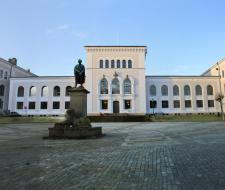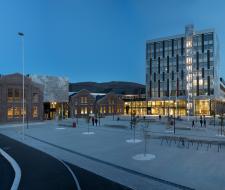Study in Norway. 9 best institutions in Norway
-
 #25 World University Rankings - Masters In Marketing
#25 World University Rankings - Masters In Marketing NorwayOsloCurrently watching: 4from 8550.00 € / yearApply with documents
NorwayOsloCurrently watching: 4from 8550.00 € / yearApply with documents -
 Apply with documents
Apply with documents -
 Apply with documents
Apply with documents -
 Apply with documents
Apply with documents -
 from 179.00 $ / yearApply with documents
from 179.00 $ / yearApply with documents -
 from 203.00 $ / yearApply with documents
from 203.00 $ / yearApply with documents -
 from 182.00 $ / yearApply with documents
from 182.00 $ / yearApply with documents -
 from 2020.00 € / 15 lessonsApply with documents
from 2020.00 € / 15 lessonsApply with documents -
 Apply with documents
Apply with documents
Alternative destinations
Education information
Norway is a Scandinavian country in Northern Europe, whose mainland territory includes the western and northernmost part of the Scandinavian Peninsula. Unlike many Western European countries, there are no ancient medieval universities in Norway. The oldest university in Oslo was founded in 1811. It was based on the progressive model of the University of Berlin at that time, created at the initiative of the largest reformer of higher education Friedrich Wilhelm Humboldt. Such a dynamic start partly explains the innovative nature of the development of higher education in the country.
Norway is a constitutional monarchy. University status can be assigned to an educational institution only with the consent of the reigning monarch of Norway.
Study in Norway: Exploring the Benefits for International Students
Norway, known for its high-quality education and welcoming environment, offers an exceptional experience for international students. Here's a guide to what you can expect when you choose to study abroad in Norway.
1. Excellence in Education and Practical Learning
Norway is renowned for its superior education system, particularly in technical and humanitarian fields. Students often engage in practical work, which forms a significant part of their learning. Smaller class sizes, often around 15 students, ensure personalized attention. Programs in engineering, architecture, business, and IT are particularly strong.
2. Welcoming and Comfortable Environment for International Students
Norway is celebrated for its inclusive and informal educational setting. It ranked first in the StudyPortals Foreign Student Satisfaction ranking, highlighting its absence of prejudice against international students. Norwegians' high proficiency in English, as evidenced by their third-place ranking in the EF EPI index, further eases the adaptation process for international learners.
3. Affordable Doctoral Studies
Despite the introduction of tuition fees for international students, Norway offers free doctoral programs. Only semester fees are applicable, making it an affordable option for higher studies.
4. Straightforward Admission Process
Applying to study in Norway is relatively simple. International applicants need to provide proof of language proficiency (in English or Norwegian), official educational documents with apostille and translation, and standard application materials like a resume and motivation letter.
5. High Living Standards
Norway boasts one of the highest living standards in the world. It consistently ranks at the top in the UN Human Development Index. The country offers a high-quality lifestyle, with impressive salary levels and a strong focus on sustainable living.
Secondary Education in Norway: A Step-by-Step Journey
Starting at age six, Norwegian primary education spans seven years, focusing on foundational skills through engaging methods. The curriculum includes a range of subjects, including English, religion, and economics. A unique aspect is the emphasis on personalized attention to students needing extra support.
Middle school education, from grades five to seven, introduces more specialized subjects like home economics, which teaches practical life skills. Students also have the option to study additional languages.
High school education, lasting from the eighth to the tenth grade, focuses on career-oriented subjects. Students can opt for vocational training in various fields, culminating in a professional diploma after practical training.

What aspects and criteria do parents consider when choosing a school, in addition to academic success?
Accommodation conditions, sports opportunities, catering and additional clubs and clubs organized by the school, proximity to the school of residences or host families are very important.
University Education in Norway: Structure and Options
Norwegian universities, aligned with the Bologna Process, offer bachelor's, master's, and doctoral programs. Bachelor's degrees take three years, master's two years, and doctorates three years. Integrated master's programs are available in fields like architecture and engineering.
The academic year is divided into two semesters, starting in August. Deadlines for application vary, with state universities requiring submissions by December 1 and private universities extending until early May.
Universities in Norway fall into three categories:
-
Universities: Focused on a broad range of fundamental sciences.
-
Specialized Universities: Offering programs in specific fields like music, sports sciences, and business.
-
University Colleges: Focused on applied sciences and vocational training.
Understanding the Costs: Study in Norway Fees
The cost of study in Norway varies depending on the type of institution and program. While doctoral studies remain free, other programs have associated fees. Prospective students should research specific universities for detailed fee structures.
Choosing the Best Programs to Study in Norway
When considering what to study in Norway, it's essential to align your interests and career goals with the programs offered. Norway excels in various fields, providing a rich educational landscape for international students.
In conclusion, studying in Norway offers a blend of high-quality education, a supportive environment, and a focus on practical skills, making it an ideal destination for international students seeking a fulfilling study abroad experience.
General educational statistics in Norway
Norway - General information
| Region | Nordic Countries |
|---|---|
| Capital | Oslo |
| Language | Norwegian |
| Currency | Norwegian Krone |
| Population | 5,096,300 |
Statistics - Rankings in Norway
| Arts and Humanities | 33 |
|---|---|
| Engineering and Technology | 31 |
| Life Sciences and Medicine | 22 |
| Natural Science | 33 |
| Social Sciences and Management | 25 |
| Mathematics | 19 |
| Computer Science | 25 |
| Economics & Business | 14 |
Statistics - Education in Norway
| Ranking of universities in the world | 17 |
|---|---|
| Academic Reputation | 36 |
| Employer Reputation | 34 |
| Quality of teaching | 29 |
| International Faculty | 23 |
| International Students | 30 |
| Citations per Faculty | 24 |
Statistics - Universities in Norway
| Universities in top 100 | 1 |
|---|---|
| Universities in top 200 | 3 |
| Universities in top 500 | 4 |
| Universities in top 1000 | 5 |
| Universities in top 5000 | 28 |
Cost of living in Norway
| Expenses - USD/Month. | Min. | Med. |
|---|---|---|
| Accommodation | 411 | 516 |
| Food | 310 | 643 |
| Transportation | 67 | 232 |
| Communications and utilities | 97 | 126 |
| Clothing | 32 | 122 |
| Sports and leisure | 33 | 140 |
| Total | 950 | 1,780 |
Accommodation in Norway
| Shared room outside of centre | 416 |
|---|---|
| Shared room in city centre | 521 |
| 1 bedroom apartment outside of centre | 727 |
| 1 bedroom apartment in city centre | 928 |



